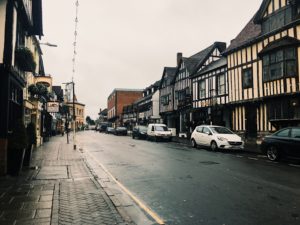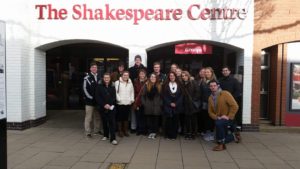By Alyssa Gautier
Features Editor
During a four-week winter course, students traveled throughout England, visiting William Shakespeare’s birthplace, spending New Year's Eve in London's Trafalgar Square and experiencing a range of British theater.
In 2011, English Professors Felicia Steele and Diane Steinberg designed the course, which has run every year since. While the syllabus and faculty adviser varies yearly, the course always exposes students to British theater and allows students to experience a “profound cultural difference,” according to Steele.
In London, students experienced the chaos and beauty of the capital city by touring the British Museum, seeing the Tower of London and visiting Westminster Abbey.
Afterwards, students traveled to Stratford-upon-Avon, a small, quaint town in England known as the birthplace of Shakespeare.

“Stratford-upon-Avon was a wonderful change of pace from the bustling streets of
London,” said Madellyn Stoner, a junior marketing major. “Stratford revolves around theater. The town is beautiful and full of wonderful people who appreciate the dramatic arts.”
Students also visited Leavesden for the Warner Bros. Studio Tour London: The Making of Harry Potter and explored the streets of Oxford on a day trip.
The trip allowed students to see the connection between geography, history, literature and art firsthand that they would not have seen had they studied literature in a classroom, Steele said.
Students saw four Shakespeare plays, including “Much Ado About Nothing” and “The Tempest,” as well as Aphra Behn’s “The Rover,” Mark Haddon’s “The Curious Incident of the Dog in the Night Time,” James Graham’s “This House” and more.
The English course is offered through the College’s Center for Global Engagement for four course units and is open to students of all majors and years, even if students are unfamiliar with theater or have grown to fear Shakespeare.
“In just four weeks, I was able to gain a greater appreciation for British theater, learn all about the life of Shakespeare and grasp the extensive history of London,” Stoner said. “This was truly an inclusive experience, most importantly anyone who was afraid of Shakespeare before this course is no longer intimidated.”
According to Steinberg, the performances breathe life into Shakespeare's classic works.
“Students are used to thinking about Shakespeare as something that the teacher drags them through unwillingly, but when they see it performed onstage, they just fall in love with it,” Steinberg said.
Gracemarie Loretta, a senior communication studies major and aspiring actress, was greatly influenced by the trip’s focus on Shakespeare.

“Before the trip, I never really studied Shakespeare. I have read plays for school, but I never performed or studied it as an actress,” Loretta said. “After this trip, I feel inspired to study Shakespeare scripts further.”
Sophomore English major Julia Pugliese also benefited from her immersion in British culture.
“The plays felt like they were directly related to me, and I was so much more enthralled in their stories,” Pugliese said. “I saw aspects of Shakespeare’s life that might have influenced his plays, and therefore, I began to see him as a real person rather than an assignment.”
Steinberg said her favorite part of the trip is observing the students experience professional theater for the first time.
“Every year we get students who have really never seen professional drama plays, and they are so blown away at what happens to a play when professionals get their hands on it,” she said. “They’re amazed at how a 400-year play comes alive in a really compelling way.”
Pugliese agreed.
“I felt like the plays had become a reality,” Pugliese said. “Reading a play on paper does not do it justice.”
In addition to watching classic works performed, students participated in an educational workshop with members of the Royal Shakespeare Company at The Royal Shakespeare Theatre in Stratford-Upon-Avon, where they learned about the rehearsal process and how the actors prepare each night.
According to Steele, short-term study abroad courses are great for students who are reluctant or nervous to study abroad, as they learn they are capable of managing the experience.
“Professor Steinberg and I are both very proud that we’ve had a lot of students that were nervous to go on this trip, but have later gone on to teach abroad or study abroad for an entire semester,” she said.

Stoner encourages everyone at the College to give studying abroad a shot.
“Four weeks was enough to open my eyes to the benefits of experiencing another culture,” she said. “Sometimes we forget to acknowledge that there is a whole world of lifestyles outside of ours.”
According to senior accounting major Edward Guippone, the trip was a great change of pace to his college experience.
“It allows you to experience a culture that is different than your own,” he said.
Studying abroad can also be a great way to create life-long friendships. According to Guippone, forming a group allowed them to make the most of their time.
“Ultimately, study abroad best serves people who are looking for an adventure and who approach new experiences with curiosity and a positive attitude,” he said.







